Golden Globes 2025: Demi Moore was the biggest winner, it’s almost guaranteed her an Oscar nomination
Overlooked and ridiculed by an industry for four decades, Demi Moore is finally stepping into her power.
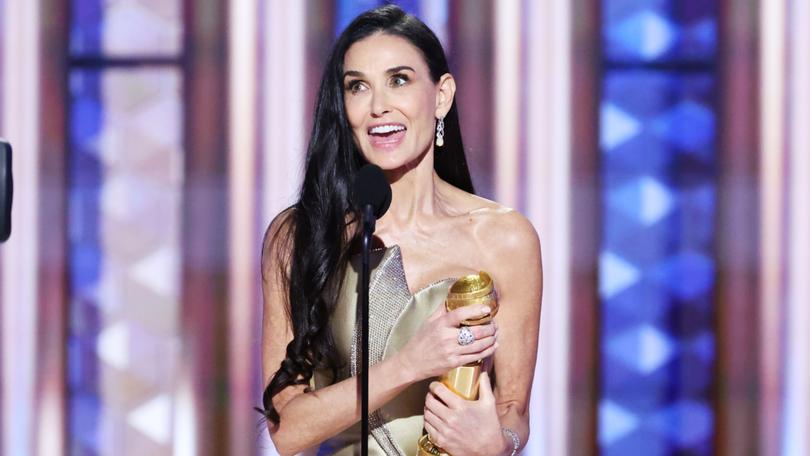
The Golden Globes is like the Oscars’ rowdy cousin. Someone who’s fun with a drink but no one you’d have a deep-and-meaningful with.
It’s a fun party with drinks but it’s not taken anywhere near as seriously.
Its real value is marketing – for the studios to shout about to audiences and for every person chasing the real prize, an Academy Award.
Sign up to The Nightly's newsletters.
Get the first look at the digital newspaper, curated daily stories and breaking headlines delivered to your inbox.
By continuing you agree to our Terms and Privacy Policy.There is no crossover between the Oscars voters (about 10,000 invite-only industry members) and the Globes body (roughly 300 journalists and critics, mostly international), but the timing of the Golden Globes ceremony is crucial.
Later this week, Oscars nominations open so if you have a great night at the Globes, you’re putting wind behind the sails of your awards campaign.
Everyone is paying attention (especially now that the Globes is owned by Penske, which also owns industry bibles The Hollywood Reporter, Variety and Deadline) so make your case as to why your name should be on that Oscars ballot.
This year, there were tons of winners, most notably The Brutalist and Emilia Perez, but the real victor is Demi Moore.
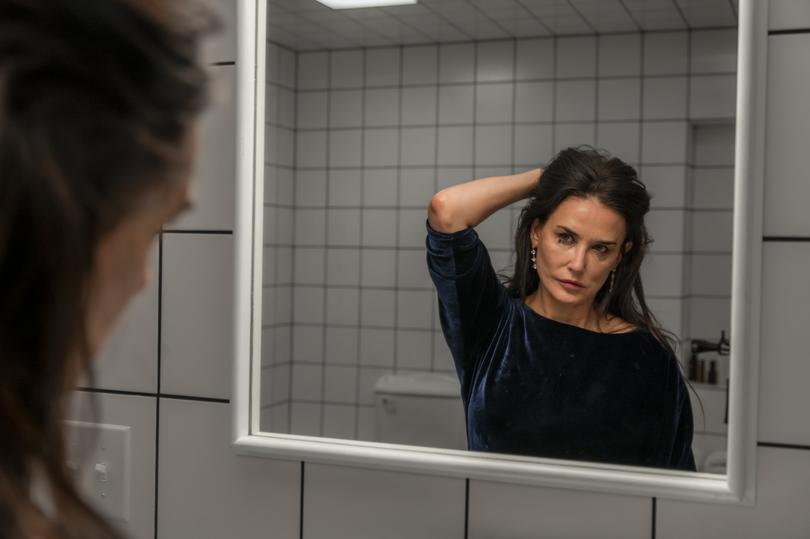
Moore won the Globe in the actress in a musical or comedy category for her raw and committed performance in the body horror film The Substance. The role required a lot of the actor, and that’s not just the prosthetics work. She is exposed in a way that seems new for someone who has been on our screens since the late 1970s.
Moore knew how to make the moment work for her – and that’s not implying that it was calculated or disingenuous – and laid out a narrative that’s going to be very appealing to Oscars voters.
She is someone who has been underestimated and boxed in, and The Substance and its director, Coralie Fargeat, freed her from the constraints of an industry who didn’t give her the roles she could’ve been doing this whole time.
Her acceptance was teeming with emotion and was brimming with gravitas.
Moore is who you want to see get up on Oscars night.
“I am in shock right now,” Moore, 62, started on stage.
“I have been doing this a long time, over 45 years. This is the first time I have ever won anything as an actor. I am so humbled and grateful.
“Thirty years ago, I had a producer told me I was a popcorn actress. At that time, I thought it meant (awards) were something I was not allowed to have. I bought in and I believed that. Over time, I thought, years ago, maybe this was it. Maybe I was complete. Maybe I had done what I was supposed to do.
“I was at a low point and I had this magical, bold, courageous, out-of-the-box, absolutely bonkers script come across my desk, called The Substance. The universe told me, ‘You are not done’.”

She then recalled an encounter she had with someone who told her that she will never “be enough” by the standards set by other people and that she had to put down the measuring stick if Moore was to “know the value of your worth”.
“I celebrate this as a marker of my wholeness, and of the love that is driving me, and for the gift of doing something I love and being reminded I do belong. Thank you,” she concluded.
Now, how do you not get behind a speech and a moment like that? That’s a powerful story Moore has just told, and everyone who saw it is thinking of all those films she was derided for over the years (Striptease, G.I. Jane, The Joneses) and all the fallow periods in which she barely worked.
Moore just locked her Oscars nomination, and don’t be surprised if her name isn’t read out on the night. One of her main rivals for the Academy Award, 25-year-old Mikey Madison from Anora, who she beat out tonight, will have to wait.
Emilia Perez also had a very good night at the Globes, winning four trophies – comedy or musical picture, non-English language picture, Zoe Saldana in supporting actress and original song.
The film is a French produced, financed and directed movie that is set in Mexico and in Spanish. While its international flavour may have found more love among the Globes voters, mostly international journalists, the Oscars voting body has also diversified to take in more non-Americans in recent years.
The story is about a drug cartel boss who fakes their own death and re-emerges as a transgender woman who tries to improve her adopted community while hiding her secret. The film is a big-hearted musical with operatic vibes and premiered in May at the Cannes Film Festival to high praise.
Spanish actor Karla Sofia Gascon, who is transgender, accepted the Globe on the film’s behalf and had a message for everyone watching.
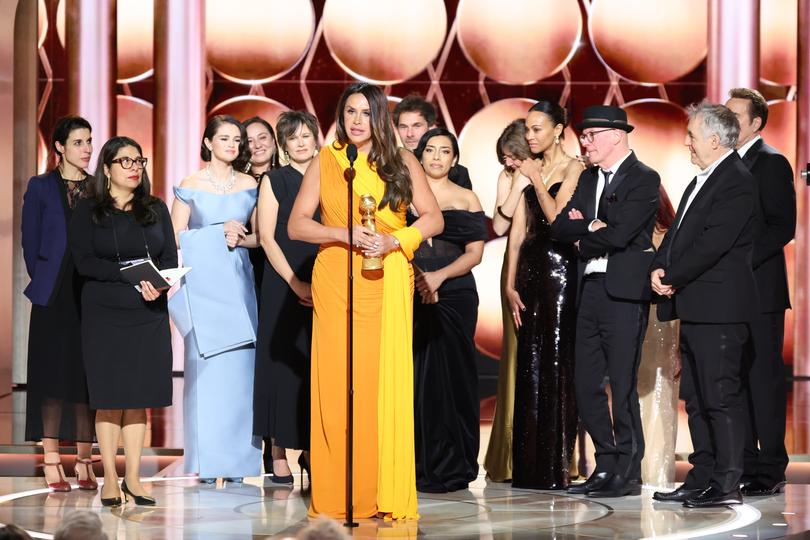
“Light always wins over darkness,” she said.
“I have a lot of things to say to you because you come and maybe put us in jail, you come beat us up bit you can never take away our soul, our resistance or identity.
“All I want to say to you, raise your voice and say, ‘I am who I am, not who you want me to be’.”
But Emilia Perez is not without its detractors or challenges, and that’s not even due to any prejudice against its story about a transgender character.
If you were watching the live telecast of the awards ceremony, you may have noticed a crowd shot in which Netflix co-chief executive Ted Sarandos gave a little fist pump after the film won.
Emilia Perez is distributed in the US on Netflix but in Australia, it will have a traditional theatrical release in cinemas on January 16 through local company Kismet.
When Emilia Perez premiered at Cannes, it was to rapturous reviews and reactions. But when it came out on Netflix in the US later in the year, it became a more divisive film.
Emilia Perez is exactly the kind of film - heightened, emotional, melodramatic - that works far, far better in an immersive cinema experience. You lose a lot of the its power if you see it for the first time on a streaming platform.
Anecdotally, those who saw it on streaming in the US were much cooler on it than those who saw it on a big screen.
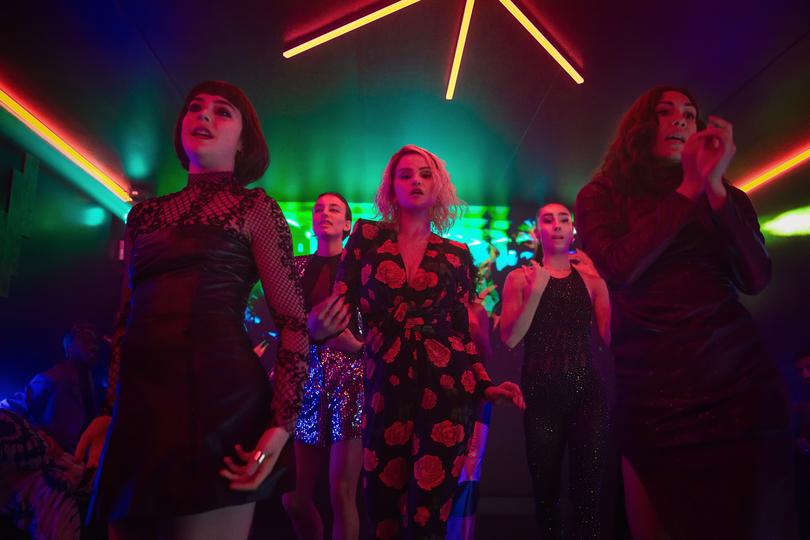
So, sure, Sarandos can give himself a little pat on the back for buying Emilia Perez (it wasn’t part of the original financing and acquired it after Cannes), but Netflix should not be congratulated for taking a cinema movie and relegating it to streaming.
No, Mr Sarandos, this win is not for you.
At least in Australia, audiences won’t be subjected to the same second-tier viewing experience.
The Brutalist’s director and co-writer Brady Corbet would have never allowed his movie to bypass a cinema release and go straight to streaming. Corbet had spent seven years trying to make The Brutalist.
Accepting the award for drama picture (The Brutalist also won for directing and for actor in a drama for Adrien Brody), Corbet said the film had fallen over so many times because “no one was asking for a three-and-a-half-hour film about a mid-century designer”.
Shot on 70mm film stock, the epic also has a 15-minute intermission hard-coded into its digital prints. Corbet made The Brutalist to be an event – and not in that Marvel or Dwayne Johnson movie way. An ambitious film with grand themes and scope that demanded attention.
His speech was curious though. You could read it as impassioned defence of the artistic vision or a self-indulgent diatribe about esoteric industry quibbles that no one at home watching it on TV will care about.
He argued that the “tie-breaker vote on the final cut should go to the director. What he’s saying is that the director, and not studio executives and suits, should have control of the finished movie that is released.
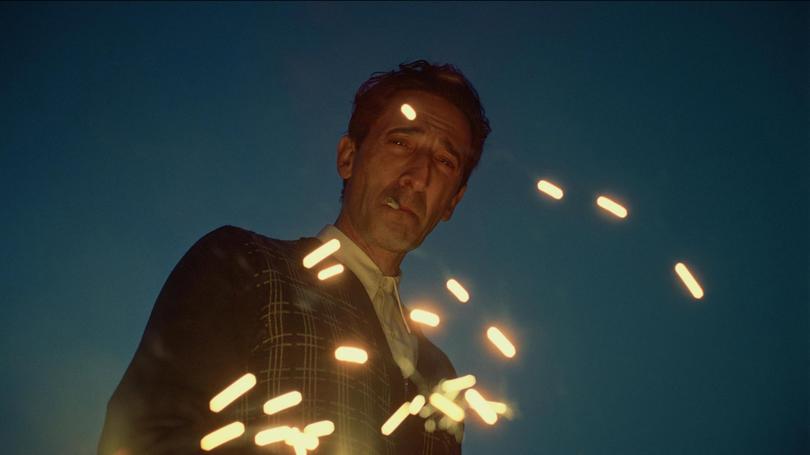
“It is a controversial statement but should not be. It should not be controversial at all. I was told that this film was undistributable, I was told that no one would come and see it, I was told the film would not work.
“I don’t resent that, and I want to use this as an opportunity to lift up filmmakers, not just fellow nominees but all the extraordinary directors in this room. Films do not exist without the filmmakers, please let’s support them, let’s prop them up.”
Corbet may be a self-serious auteur but it is his ambition that has seen him make three bold films by the age of 36. His debut feature was The Childhood of a Leader, a baroque, spiky historical drama starring Robert Pattinson, adapted from a short story by Jean-Paul Sartre. Corbet was 26 years old. That’s not someone trying to cruise.
The Brutalist, out in Australia on January 23, is not a perfect film but that Corbet was able to make it, all three-and-a-half hours of it, for a budget that didn’t even hit $US10 million, is astonishing. That wouldn’t even cover the cost of the special effects for one scene in a Fast & Furious movie.
Come Oscars night, expect The Brutalist to have a presence.
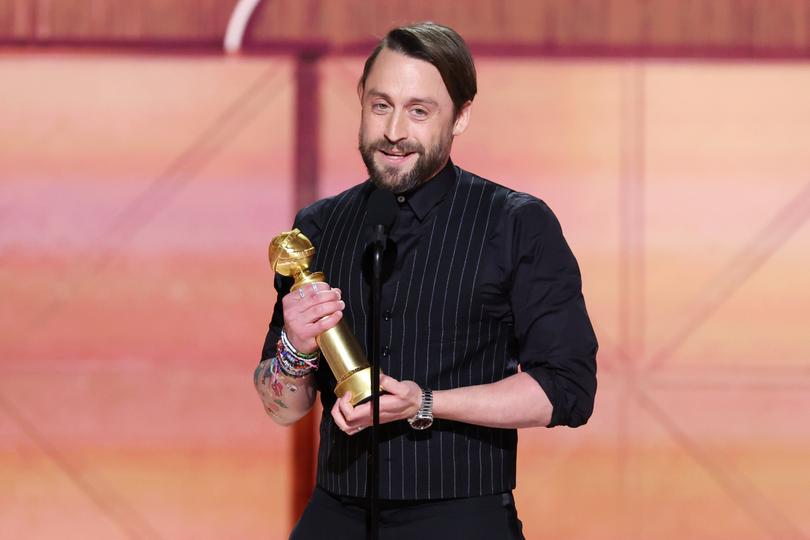
Elsewhere, the Globes voters spread the love with a stack of other films picking up awards. Conclave, out on January 9, won in the screenplay category while Trent Reznor and Atticus Ross picked up original score for their pulsating music for Luca Guadagnino’s Challengers.
An independent Latvian animation with no dialogue picked up animated feature, beating out Pixar and Dreamworks, and Kieran Culkin shored up his frontrunner status in the supporting actor race for his performance in A Real Pain.
In fact, Culkin is about the only sure bet in an awards season that’s still relatively open. Emilia Perez and The Brutalist competed in different categories at the Globes but at the Oscars, there is no distinction between drama and comedy/musical.
There were some surprises with Brazilian actor Fernanda Torres winning for I’m Still Here while Sebastian Stan picked up an acting gong for A Different Man. The Stan victory is interesting in that he was a double nominee (also for The Apprentice) but almost all the nods in the comedy/musical actor list aren’t serious contenders for an Oscar.
Stan has a had a good year with those two roles, which proves he’s far more than a superhero star, and his speech, in which he referenced his mother and her immigration from Romania, was very endearing. Expect meatier roles for Stan after this.
The Globes also gives out gongs for TV but those are pretty inconsequential – and almost beat-for-beat mimicked the 2024 Emmys from last September, except for two deviations (Colin Farrell winning for The Penguin, which had not been eligible at the Emmys, and Shogun’s Tadanobu Asano who had lost to Billy Crudup last year).

